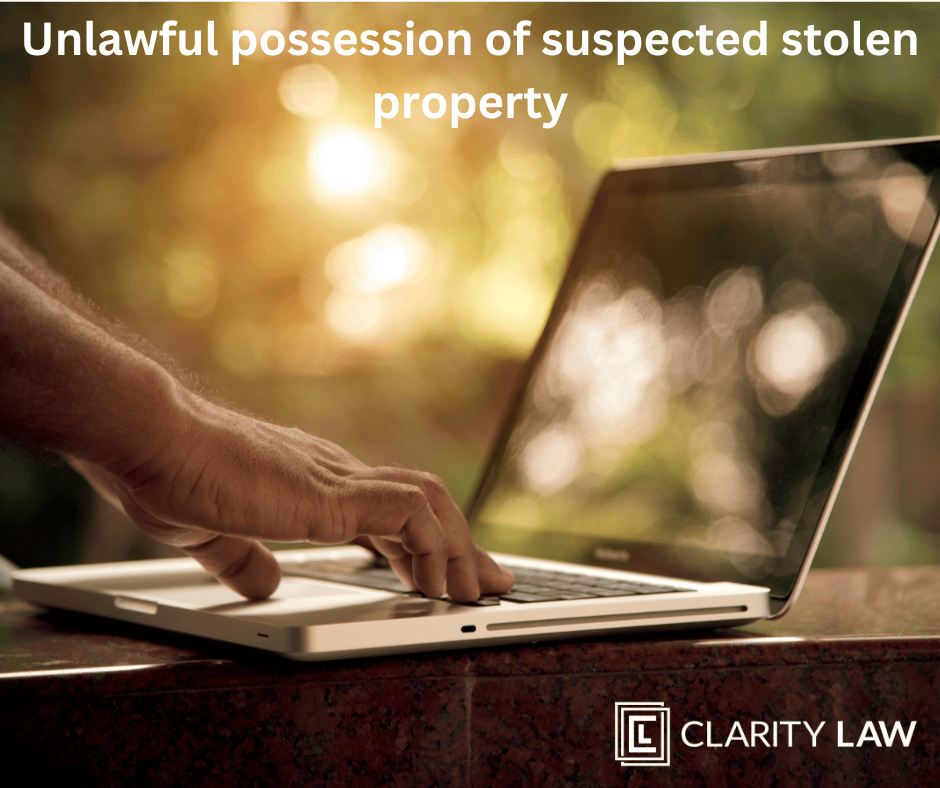
Have you been accused of possessing something that was stolen or unlawfully obtained? If so, you may have been charged with an offence under section 16 of the Summary Offences Act (Queensland). This offence is commonly known as unlawful possession of suspected stolen property and it carries a maximum penalty of 20 penalty units or one year's imprisonment.
What does the offence mean?
The offence of unlawful possession of suspected stolen property means that you have something in your possession that you reasonably suspect has been stolen or unlawfully obtained by someone else. For example, if you buy a laptop from a friend who tells you that they got it from a car they broke into, you are likely to be committing this offence.
The key element of this offence is that you must have a reasonable suspicion that the thing you possess is stolen or unlawfully obtained. This means that you must have some facts or circumstances that would make an ordinary person in your position suspect that the thing is not lawfully yours. It is not enough to have a vague feeling or a hunch that something is wrong.
Do the police need to do anything before they arrest someone?
Pursuant to the Police Powers and Responsibilities Act the offence of unlawful possession of suspected stolen property is a “declared offence”. This means that in order to arrest someone the police should first, if reasonably practicable, give the person a reasonable opportunity to explain how the person came to have possession of the thing.
If:
- The person fails to give an explanation; or
- The police officer considers the explanation given is not a reasonable explanation; or
- Because of the person’s conduct, it is not reasonably practicable to give the person a reasonable opportunity to give an explanation;
The police officer may start a proceeding against the person for the declared offence.
What does the prosecution need to prove?
The prosecution does not have to prove that the thing was actually stolen or unlawfully obtained, only that you reasonably suspected it was. However, if the thing was in fact lawfully yours or you had a lawful excuse for possessing it, you may have a defence to the charge.
The prosecutions must prove the following:
- That the defendant unlawfully;
- Possessed;
- A thing that is reasonably suspected of having been stolen or unlawfully obtained.
Lets look at those keywords in more detail.
Unlawfully
In general “unlawfully” means without authorisation, justification or excuse by law.
In Castle v Farmer The judge said about what unlawfully means as follows
“There is no burden on a suspected person to prove a satisfactory explanation on the balance of probabilities. The consequence is that the burden of proving unlawful possession is upon the prosecution, and the standard of proof will be beyond reasonable doubt. Any explanation will be part of the evidence at the trial”
Possessed
“Possession” includes having under control in any place whatever, whether for the use or benefit of the person of whom the term is used or of another person, and although another person has the actual possession or custody of the thing in question.
A thing that is reasonably suspected of having been stolen or unlawfully obtained
It requires the existence of facts which are sufficient to induce that state of mind in a reasonable person that the item was stolen or unlawfully obtained.
What are some possible defences?
There are several possible defences to the charge of unlawful possession of suspected stolen property, depending on the facts of your case. Some of these include:
- You did not possess the thing at all. For example, if the thing was found in your car but it belonged to someone else who left it there without your knowledge.
- You did not have a reasonable suspicion that the thing was stolen or unlawfully obtained. For example, if you bought the thing from a reputable store or online seller and had no reason to doubt its legitimacy.
- You had a lawful excuse for possessing the thing. For example, if you were holding the thing for someone else who had a lawful claim to it, or if you were acting under a legal duty or authority.
- You acted honestly and reasonably in relation to the thing. For example, if you found the thing and reported it to the police or tried to return it to its owner.
What are the likely penalties?
The law sets the maximum penalty at 1 year imprisonment and 20 penalty units (currently $3,096).
In general, for a first offence the court will be looking to impose a fine or a good behaviour bond.
The court has the discretion whether to record a conviction or not. When deciding whether to record a conviction to court looks at the following;
- The nature of the offence
- The offenders character and age
- The impact on the offenders
- Economic or social wellbeing; or
- Changes of finding employment
If the court imposes a bond then it cannot record a conviction.
If you are charged with this offence in Queensland, it is important to seek legal advice from an experienced criminal lawyer who can advise you on your options and represent you in court. A criminal conviction can have serious consequences for your future, such as affecting your employment opportunities, travel plans and reputation.





